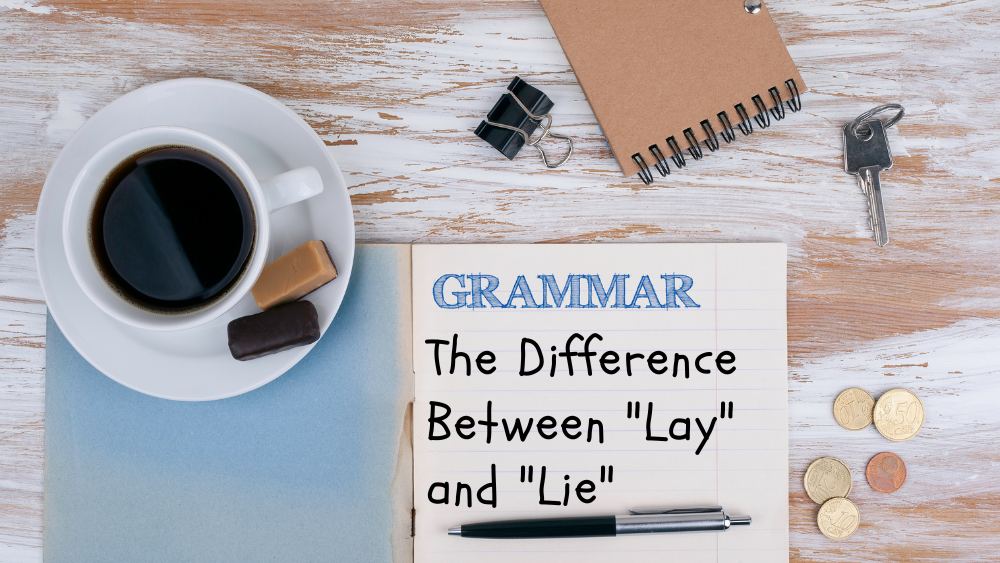
The Difference Between “Lay” and “Lie”
Know the difference between Lay and lie, one of the most common grammar mistakes that even seasoned writers make is confusing the verbs “lay” and “lie.” While these words are often used interchangeably in casual conversation, they actually have distinct meanings and uses in proper English grammar. In this blog post, we’ll clarify the difference between these two verbs and provide examples to help you use them correctly in your writing.
The verb “lay” is a transitive verb, which means it requires a direct object. In other words, you lay something down. For example:
- Please lay the book on the table.
- I lay my head on the pillow every night before sleep.
- She laid the baby in the crib gently.
The verb “lie,” on the other hand, is an intransitive verb, which means it does not require a direct object. It means to recline or rest in a horizontal position. For example:
- I’m going to lie down for a quick nap.
- The dog likes to lie in the sun all afternoon.
- He has been lying in bed all day, feeling sick.
One way to remember the difference is to think of the phrase “lay it down.” If you can add “it” after “lay,” then you know you’re using the verb correctly.
Another point of confusion is the past tense of these verbs. The past tense of “lay” is “laid,” while the past tense of “lie” is “lay.” This can make things tricky, but here are some examples:
- Yesterday, I laid the papers on your desk. (past tense of “lay”)
- Last night, he lay awake for hours. (past tense of “lie”)
The past participle of “lay” is “laid,” while the past participle of “lie” is “lain”:
- She had laid the groundwork for the project before she left. (“laid” as past participle of “lay”)
- They have lain in the sun too long and got sunburned. (“lain” as past participle of “lie”)
In conclusion, remembering the difference between “lay” and “lie” is important for maintaining clarity and professionalism in your writing. By keeping in mind that “lay” requires a direct object and “lie” does not, and by familiarizing yourself with the correct past tense and past participle forms, you can avoid this common grammar pitfall and ensure that your writing is polished and error-free.
Etymology of Lay and Lie
The verbs “lie” and “lay” have different etymologies, although they have become intertwined over time due to their similar meanings and forms.
“Lie” (intransitive verb, meaning to recline):
- Old English: “licgan”
- Proto-Germanic: “*ligjan”
- Proto-Indo-European: “*legh-” (to lie down, lay)
The verb “lie” has cognates in many Germanic languages, such as Dutch “liggen,” German “liegen,” and Swedish “ligga.”
“Lay” (transitive verb, meaning to put or place):
- Old English: “lecgan”
- Proto-Germanic: “*lagjan”
- Proto-Indo-European: “*legh-” (to lie down, lay)
The verb “lay” also has cognates in other Germanic languages, such as Dutch “leggen,” German “legen,” and Swedish “lägga.”
Interestingly, both “lie” and “lay” can be traced back to the same Proto-Indo-European root “*legh-,” which had the meaning of “to lie down” or “to lay.” Over time, the two verbs developed distinct usages in English, with “lie” becoming intransitive and “lay” becoming transitive.
The shared Proto-Indo-European root explains why the past tense of “lie” (meaning to recline) is “lay,” which is identical to the present tense of “lay” (meaning to put or place). This overlap in forms has contributed to the confusion between these two verbs in modern English usage.
Practice Questions
- I’m feeling tired. I think I’ll just (lay/lie) down for a quick nap.
- Could you please (lay/lie) the book on the table when you’re finished with it?
- The dog always (lays/lies) in front of the fireplace to stay warm.
- Yesterday, I (laid/lay) on the beach for hours, soaking up the sun.
- The teacher asked the students to (lay/lie) their pencils down when they finished the test.
- The cat (laid/lay) in the same spot on the couch all day.
- I couldn’t sleep last night because my partner (laid/lay) their head on my pillow.
- The construction workers carefully (laid/lay) the bricks to build the wall.
- The rules of the game (lay/lie) in the instructions manual.
- Every evening, I (lay/lie) out my clothes for the next day to save time in the morning.
- 100 Screenwriting Ideas to Get You Writing - January 20, 2026
- 100 Winter Storm Writing Prompts - January 17, 2026
- 100 Haunted House Story Starters: Craft Your Scariest Tale Yet - January 10, 2026



